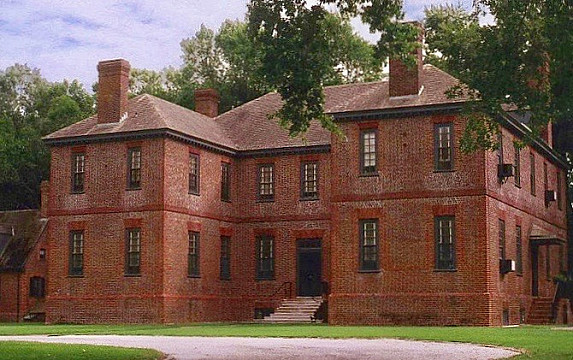Elsing Green
State Route 632, West Point & Tunstall, King William County, Virginia
Built 1715-20, for Capt. William Dandridge (1689-1744) and his wife, Unity West (1703-1753). Overlooking the Pamunkey River, the original house (now the east dependency of the existing mansion) dates back to 1690 when it was built as a lodge by Mrs Dandridge's grandfather, Col. John West, nephew of Governor Thomas West. After Colonel West died, the Dandridges built the mansion and the kitchen dependency on the other side of the lodge to match. The 2,254-acre plantation itself has been in continuous operation for more than 300-years and is now owned by the Lafferty family as a model farm and wildlife preserve, but it's privately occupied and not open to visitors....

This house is best associated with...
After Mrs Dandridge (whose husband was the uncle of First Lady Martha Washington) died in 1753, her heirs sold the plantation to Carter Braxton who was a grandson of Robert "King" Carter and grew up at nearby Newington before becoming a Signer of the U.S. Declaration of Independence. In 1757, distraught after the death of his first wife, Judith Robinson, of Hewick, he went to Europe for three years. On his return, he married Elizabeth Corbin, and the following year his elder brother died leaving him with significant debts that forced him to sell Elsing Green in 1767, moving to the nearby Chericoke Plantation. The new owner was William Burnet Browne (grandson of William Burnet, Governor of New York, New Jersey, Massachusetts and New Hampshire) whose wife, Judith Carter, was Braxton's first cousin - another grand-daughter of "King" Carter.
Browne died without a male heir in 1784, settling Elsing Green with his substantial fortune on his eldest grandson, William, on the condition that he take the surname "Browne" whch was made legal by an Act of Legislature in 1804. William Browne held on to the plantation until 1820 when he sold up to William Gregory whose family would hold it for over a century before selling to Beverly D. Causey in the 1930s who set about restoring the old house to its former glory. In 1950, Edgar Rivers Lafferty, Jr., became the new owner and as well as continuing the restoration work started by the Causeys, he also substantially enlarged its landholdings. Lafferty established the Lafferty Foundation and in 1980 was granted a preservation easement with the Virginia Historic Landmarks Commission and the Virginia Outdoors Foundation, protecting the house from demolition and the land from subdivision or commercial development. Elsing Green is listed on the National Register of Historic Places and is designated as a National Historic landmark.
Browne died without a male heir in 1784, settling Elsing Green with his substantial fortune on his eldest grandson, William, on the condition that he take the surname "Browne" whch was made legal by an Act of Legislature in 1804. William Browne held on to the plantation until 1820 when he sold up to William Gregory whose family would hold it for over a century before selling to Beverly D. Causey in the 1930s who set about restoring the old house to its former glory. In 1950, Edgar Rivers Lafferty, Jr., became the new owner and as well as continuing the restoration work started by the Causeys, he also substantially enlarged its landholdings. Lafferty established the Lafferty Foundation and in 1980 was granted a preservation easement with the Virginia Historic Landmarks Commission and the Virginia Outdoors Foundation, protecting the house from demolition and the land from subdivision or commercial development. Elsing Green is listed on the National Register of Historic Places and is designated as a National Historic landmark.
You May Also Like...
Categories
Styles
Share
Connections
Be the first to connect to this house. Connect to record your link to this house. or just to show you love it! Connect to Elsing Green →










